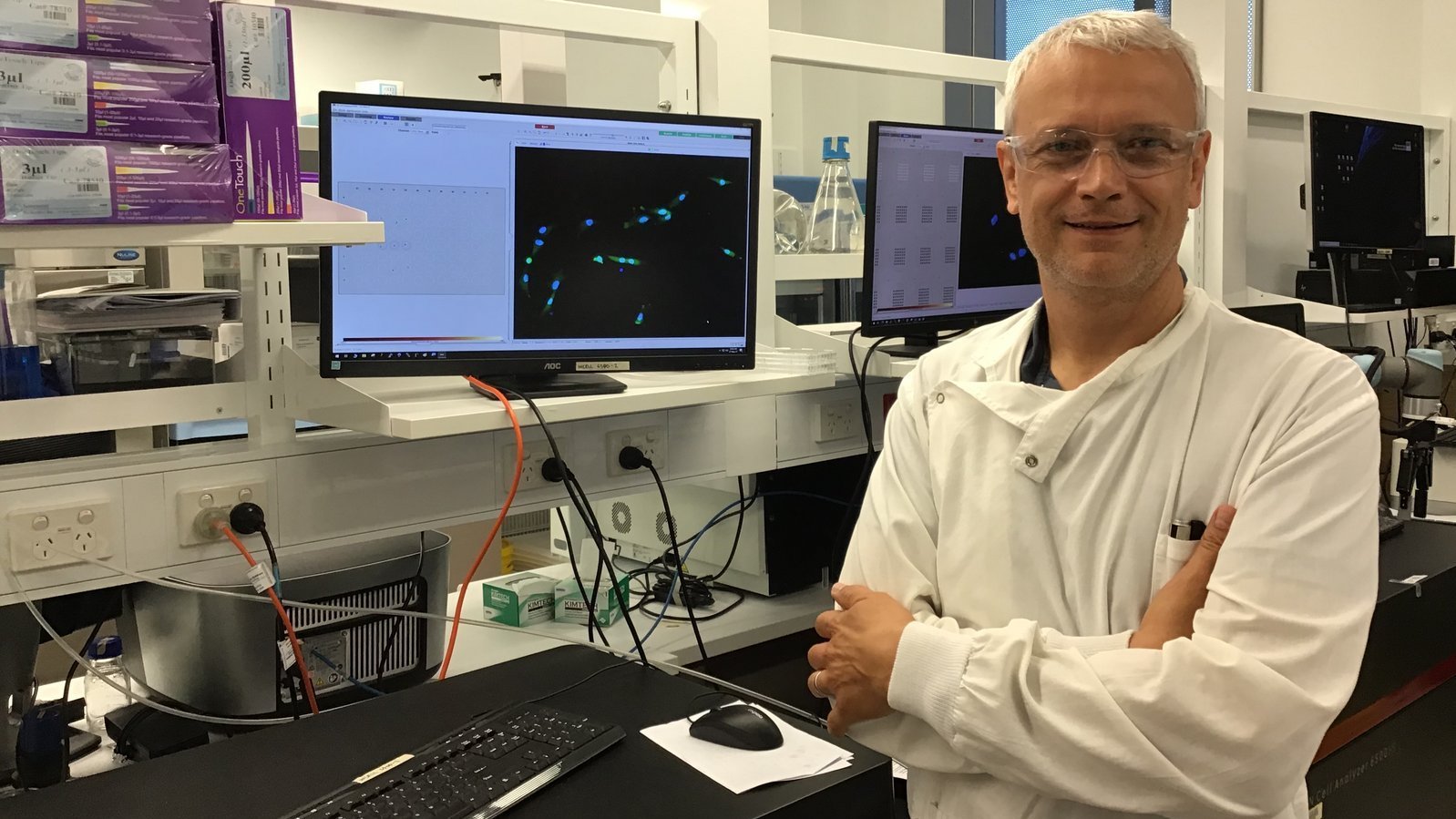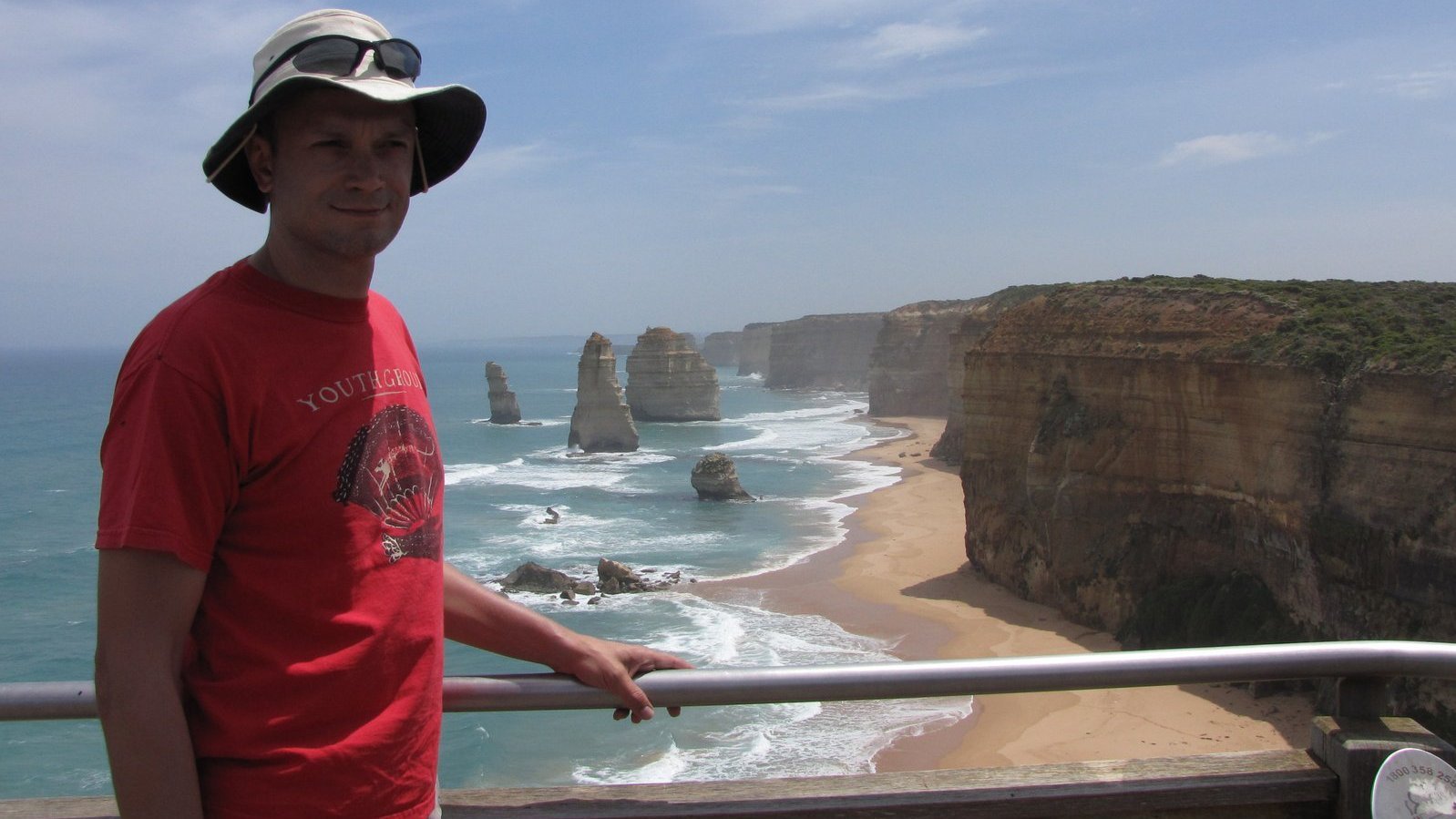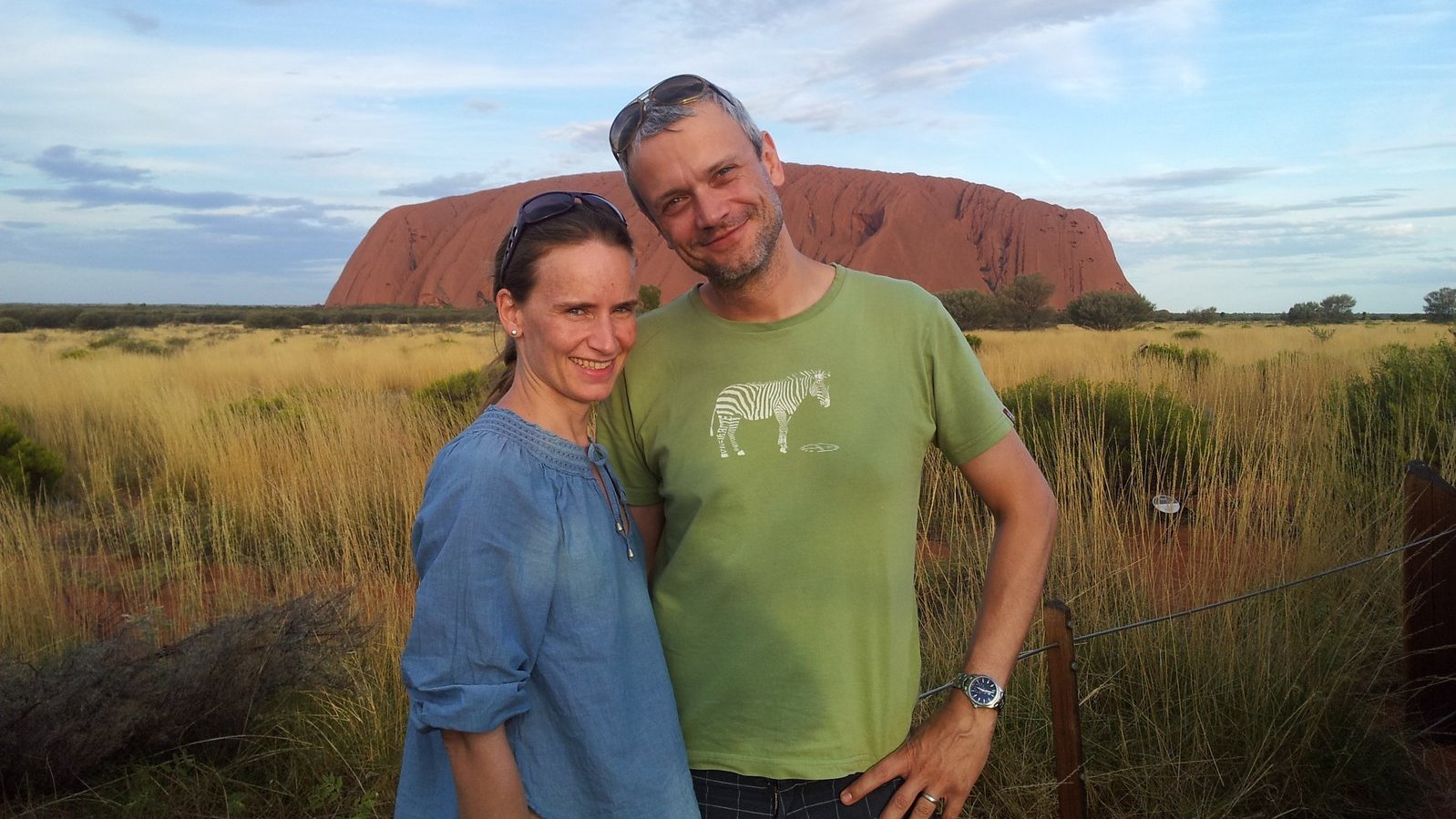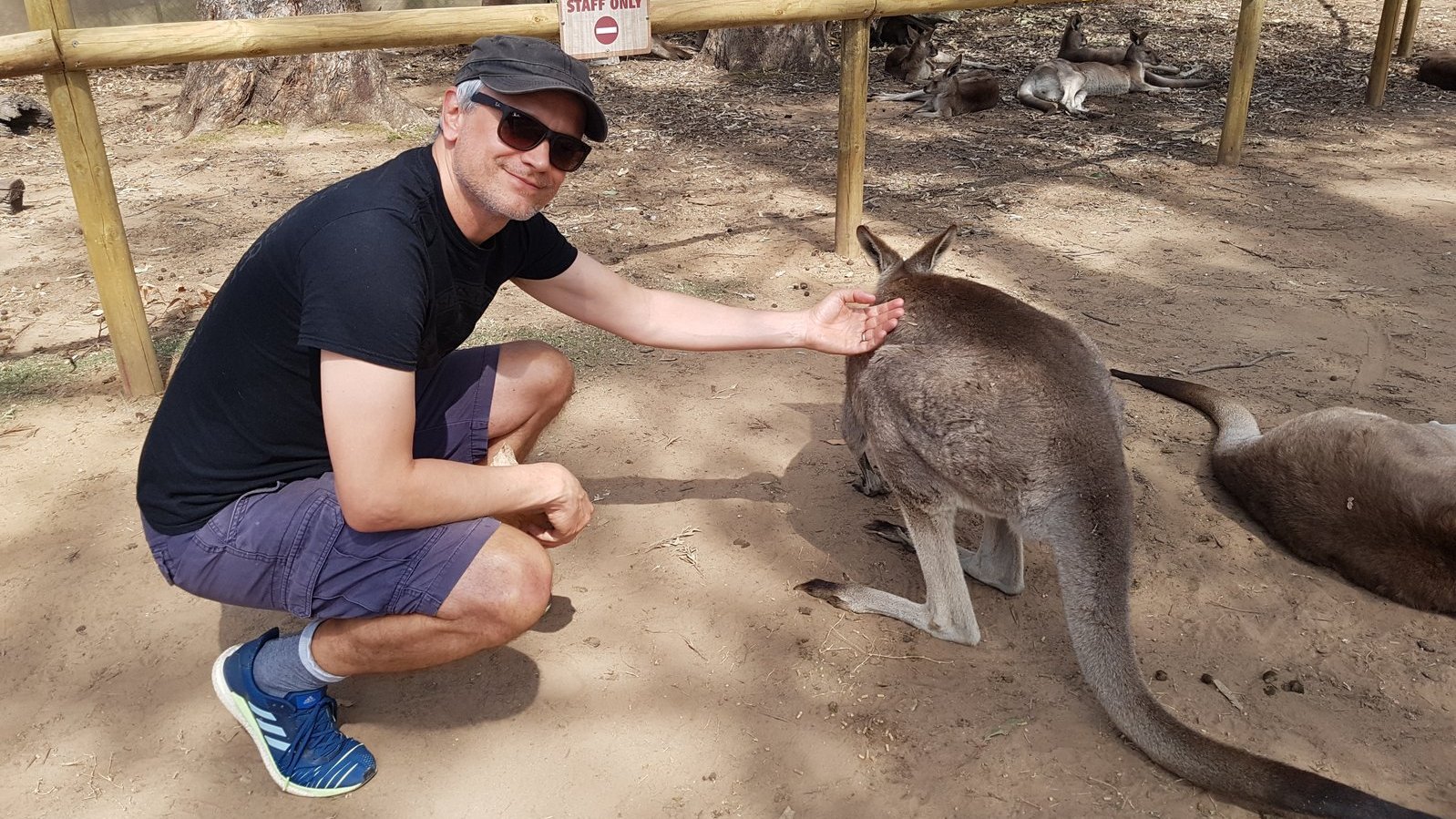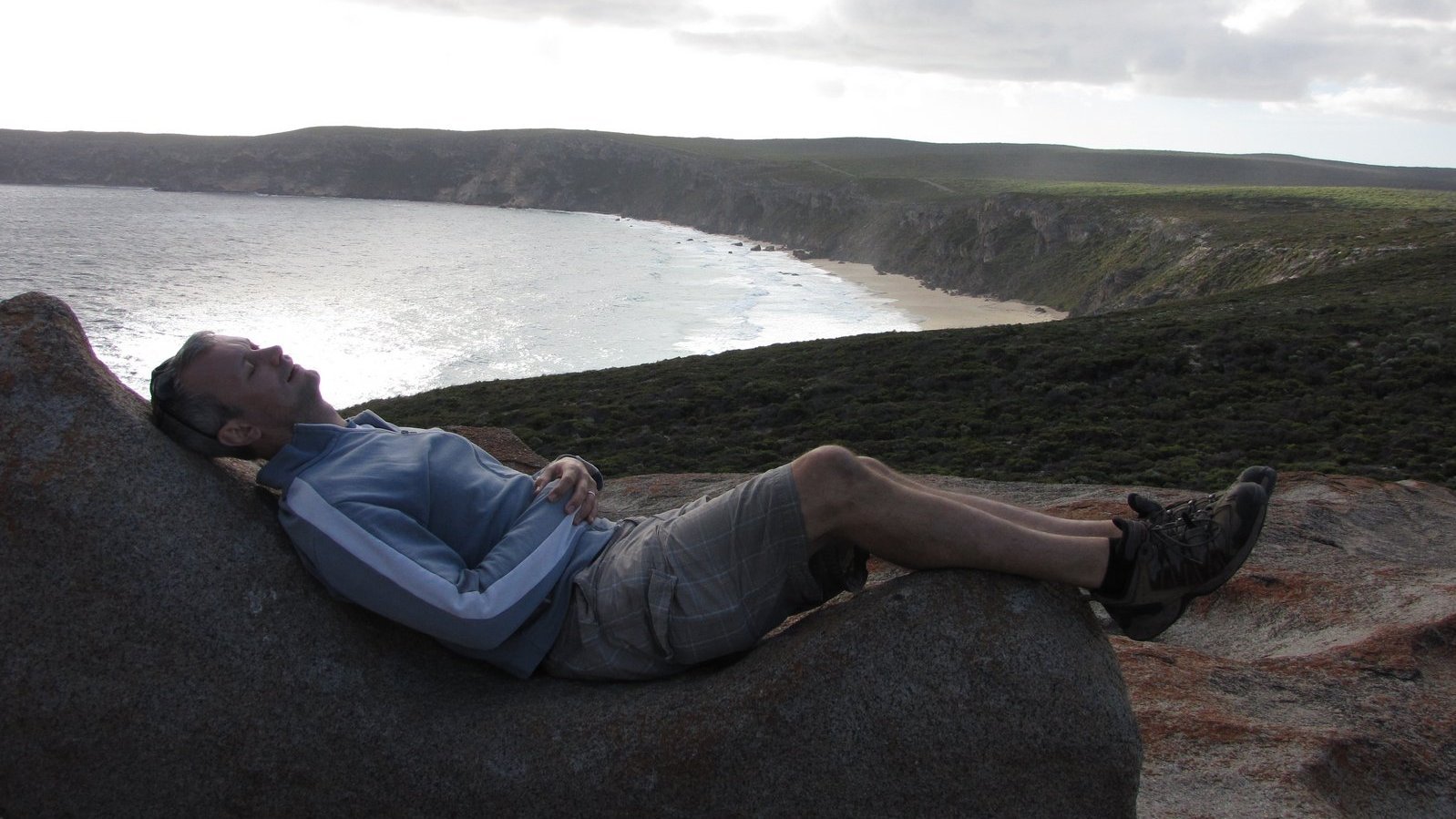From Frankfurt (Oder), to Down Under
His was to be the final high school graduation year of former East Germany, the ‘DDR’. Aged 30, and after ten years working in the banking sector, Karsten Schrobback suddenly decided to study bio-technology at the h_da. However, what had begun as an intermezzo – of preparing his diploma thesis in Brisbane – took on a life of its own: 15 years on, and still counting. Now roughly 50, he can look back on an extraordinary life from the other side of our planet – with several spirited changes of direction thrown in, for good measure.
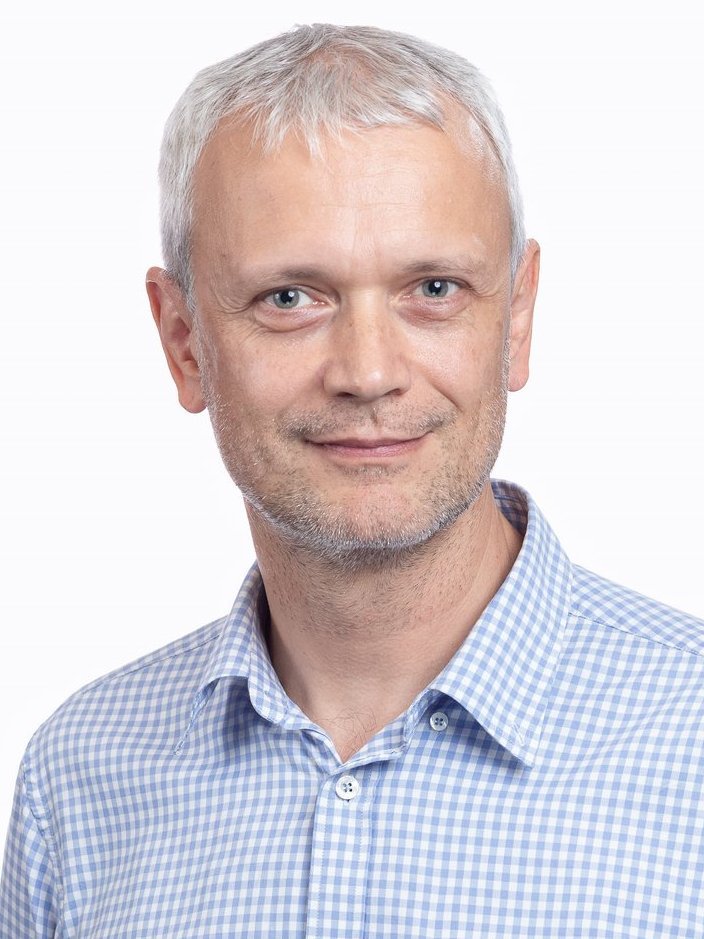 Portrait photo of Karsten Schrobback
Portrait photo of Karsten Schrobback
Tanned, sporting a striped t-shirt and pretty laid-back, could sum up first impressions of Dr Karsten Schrobback as he joins us in a video chat from his office. It’s 9 p.m. local time, however: “this is always a good time for this, as the kids are nicely tucked up in bed.” Schrobback lectures at the Biomedical Sciences faculty of the Queensland University of Technology (QUT), as well as being a group supervisor at CARP Pharmaceuticals. The federal state of Queensland, in the north-east of Australia, is around five times the size of Germany – and it boasts a 7,000 kilometres coastline. Life in the state capital Brisbane basically entails having popular surfing grounds on your doorstep, and the Great Barrier Reef within reach. What kind of role can such an environment play? Schrobback grins and says “Australians are pretty laid-back, an attitude made more accessible by 200 days of sunshine per year! The quality of life and living it outdoors almost all the time is really great – you just meet up in parks or on the beach loads.”
Slowing down the progression of diseases
CARP stands for Cancer and Ageing Research Program. Schrobback pauses briefly before explaining the program’s remit, discovering that, to date, he’s never needed to describe things in German – which he nonetheless does, with aplomb: “diseases such as cancer are mainly due to errant changes in the genetic code, and although cells are equipped with elaborate repair mechanisms to combat this, their efficacy tends to diminish with age. We research which mechanisms and proteins are involved, and are trying to develop pharmaceutical agents to slow down a cancer’s progression, then hopefully even bring it to a standstill.”
That Karsten Schrobback is quickly able to acquire the requisite technical competency his target group expects may have something to do with the fact that lecturing now accounts for roughly half of his working day. Previously, his time had been devoted to researching. He points out that “I’ve only been researching in this field for three and a half years to date. Beforehand, I focussed on researching osteoarthritis, and cartilage regeneration in knee joints in particular. We were mainly looking at cultivating appropriate tissue in the lab, however, I became increasingly frustrated with such a ‘classic’ engineering approach.”
In the meantime, he now focuses more on researching biological processes at a cellular level – and lecturing. Finding pleasure in his work is highly motivating for Karsten Schrobback. “I’ve found out how much I enjoy lecturing. My experiences have convinced me that you can only be truly good at something when you have fun doing it. I’d say that curiosity and sheer interest in a task are what motivate me the most.” He feels the clarity of this self-awareness has been evolving throughout his life.
The wall came down – bringing newness crashing down on him
In 1990 Karsten Schrobback belonged to the final high school graduation year of former East Germany, the ‘DDR’. Once his school days were over, and the wall had fallen, he was confronted by many novelties. As he recalls “everything suddenly changed and I felt faced with – what should I do now? Well, training to be a banker sounded safe enough”. After only a few months, Deutsche Bank transferred him to the capital, Bonn. As he recalls “it was one hell of a switch from the deeply red DDR across into arch-conservative Bonn. To my eyes, the cultural differences between East and West were marked and significant – especially in the ways people interacted with one-another.”
Schrobback went on to graduate as a banking specialist from a career-integrated study course at the Frankfurt School of Finance & Management. He changed posts several times, working in Frankfurt am Main, Augsburg and Strasbourg, among other places. Unfortunately, he wasn’t happy. “It took me quite some time to realise that it wasn’t me who was fault, but rather the job itself.” As he became aware of this during 2001, he altered tack, radically. “Affecting such a change aged 29, having earned a regular salary for the past ten years, led to plenty of brooding, insecurity and anxiety, however, my convictions that radical change was needed proved more resilient.” He adds, “looking back I’m actually surprised to have stuck it out that long”.
So what now? He’d been interested in both biology and chemistry at school, “the bio-technology sector was burgeoning at this time; a combination I found fascinating”. His search for a suitable university led him to the former FH Darmstadt, where he joined the first semester of the fresh bio-technology diploma degree course. His intuitive choice was on the button: “I felt the course’s greatest plus was its focus on practical training. It’s a great advantage, in the bio-medical sector, to have previously juggled with a pipette, yourself”.
Australia? It all just clicked
It was almost by accident that Schrobback ended up in Australia. As he recalls, “in 2005 I just felt like getting away from Europe, and writing my diploma thesis somewhere abroad”. He sent inquiries to Canada and Australia. “QUT in Brisbane answered via email: ‘we’ll take you on, come on down’.” He’d met his girlfriend at the time, and current wife, in Frankfurt (Oder), and she’d recently graduated from her economics degree course in Frankfurt am Main. She also promptly found a job in Brisbane. Karsten Schrobback laughs “it all simply worked out – and the rest is history”.
That they both quickly assimilated was due, in part, to Australia’s almost legendary open-hearted hospitality. “Australians are very warm-hearted. During the first few days in Brisbane, once we pulled out a street map, we’d be surrounded by two or three people offering to help. It was great – and so different to civility levels in Eastern Brandenburg”, Schrobback says, grinning. Everything continued to work out: he switched seamlessly to completing his doctorate at the QUT – and then, in 2007, he joined his long-term girlfriend Peggy for them to walk down the aisle together.
After a two-year detour as a postdoc member of a research group at Christchurch Hospital in New Zealand, Karsten Schrobback returned to Brisbane in 2012. The couple’s two daughters were born in the following years, events that changed his attitudes towards life and work, “it puts everything into perspective.” Procuring a suitable academic post in his field is problematic, “it’s such a problem to find the permanent position that will provide the security needed, but at the end of the day, a door always seemed to open, until that follow-up contract materialized.” Raising children in combination with full-time work occasionally pushed them to their limits. “But you also have so much fun!” Schrobback isn’t worried about not being able to let go professionally later on: “I really don’t feel the need to work until I turn 70.”
COVID-19 proves to be a turning point
Australia’s response to the Covid pandemic, including closing the borders early on, was rigorous yet highly effective. Karsten Schrobback says the effects of the restrictions on his work have been ‘manageable’. “Our field of Biomedical Sciences is comparatively independent of international students’ influx.” As is the case in Germany, video conferences in research and lecturing fields have quickly become the new norm. Simultaneously, the QUT also re-introduced attendance teaching, with fewer people present and distancing rules, as early as the second semester of 2020. Nonetheless, students in Brisbane also suffered from reductions in attendance events. “Furthermore, the absence of students from the Asian region adversely affects Australia quite badly, on the whole.”
He feels the ban on travelling is affecting his family the worst. Grandparents in Germany, in particular, find not being able to see their grandkids most troublesome. “We sorely miss being near to our family. COVID-19 has a way of showing us the cracks in our ways of life.” All four Schrobbacks possess dual nationality by now, so might they return to live in Germany at some stage? “Never say never”, says Karsten Schrobback, yet the fact that he replies spontaneously in English, not in German, could well be an unwitting pointer.
